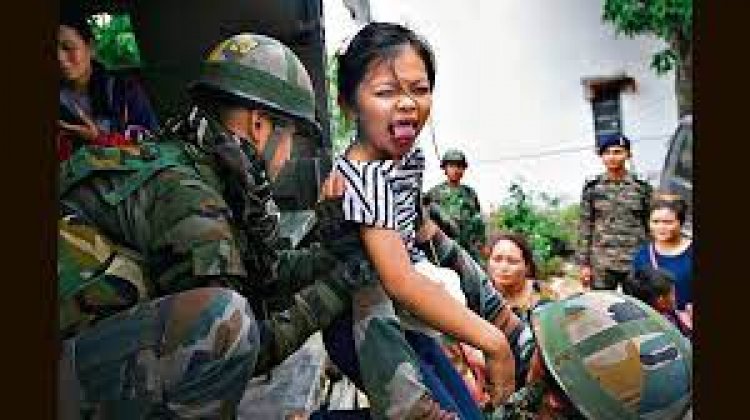Manipur: Unbridgeable Divide Needs Careful Handling
Asia News Agency

In fresh violence, nine Meitei men were killed and 10 injured in Khamenlok, a Kuki village in Imphal East district of Manipur Tuesday night. An official said the killing was likely in retaliation for the torching of houses by Meitei groups in Kuki villages over the past three days. The dead were part of a mob of nearly 3,000, some carrying sophisticated weapons, who entered Kuki villages in Kangpokpi district and destroyed homes.
Later, Thursday, the residence of Union Minister R K Ranjan at Kongba in Imphal was torched by a mob. The Union Minister was not at home at the time of the incident.
The extended problem opens avenues for China
The core of the extended problem in Manipur is the conflict between Meiteis usually Hindu and Kukis who are Christian. The mayhem in the border state, writes Abhijit Bhattacharyya (author and columnist) “opens a vast new vista for China to take on India through another front of misfortune.”
That is why, the prolonged violence in the security sensitive Manipur state, which has gone on for over a month now and has claimed more than 100 lives and displaced thousands more, is disturbing. It has “opened many raw wounds that most people had hoped belonged to a bygone era,” writes M.K. Narayanan (former Director, Intelligence Bureau, a former National Security Adviser, and a former Governor of West Bengal). “The spectre of an unbridgeable divide between the Meiteis on the one hand and the Kuki-Chin-Mizo-Zomi-Naga tribes on the other is now all too evident, and any resolution will demand utmost sensitive handling. The ethnic divide and violence seems to suggest that little has changed in the northeast, notwithstanding the many developments in place. Thus the healing process is likely to be a long-drawn-out one.”
Resurgence of ultra-nationalistic tendencies
A particular dimension in the northeast, according to Narayanan is the “presence of ethnic sub-nationalism and identity politics in an aggravated form. Ethnic allegiance had oftentimes been in conflict with mainstream nationalism or vice-versa previously, but it was hoped that such tensions had subsided. The Manipur developments imply that in much of the northeast, ethnic identities still overshadow and overwhelm all other considerations. What is also disturbing is that according to some reports from the region, consolidation efforts by different tribal entities were resulting in subterranean pressures, and the result is that many issues which were deemed settled seem to have been reopened. This applies specially to Manipur where, of late, there have been incipient signs of a resurgence of ultra-nationalistic tendencies. The confrontation between Meitei versus Kuki-Naga ultra-radicalism, as evidenced in Manipur these past weeks, needs to be viewed in the larger context of the conflict between the plains Meiteis and the Kuki-Mizo-Chin-Zomi-Naga hill tribes. What we witness in Manipur today is a conflict between charged up Meitei chauvinism seeking to consolidate their position within Manipur and across the region, in opposition to the Kukis, Mizos and other tribes…..”
Complete polarisation
Currently, the “polarisation between the majority Meitei, and the other tribal communities, in Manipur appears total and irreconcilable. Notwithstanding the peace moves by the central authorities, fresh outbreaks of violence continue. Relocation of the two communities is taking place vigorously with parts of the State being designated as Meitei and Kuki, respectively. The demand for a separate administration as a prelude to the division of the State along these lines is currently gaining momentum.
“The State Government — more specifically, the Chief Minister — has come under severe attack by the Kuki tribals for the ongoing violence. This is accompanied by accusations that the police are siding with the Meitei attackers. Meitei elements, in turn, have threatened to form a ‘civilian defence force’ to protect their people against attacks by Kuki militants. Old issues are being resurrected….. Demands for the dismissal of the State government and the imposition of President’s rule under Article 356 of the Constitution, alongside a demand by tribal groups such as the Kukis-Chins-Mizos-Zomis, urging the Centre to give the region inhabited by them a separate administration, are being vociferously raised.”
Delhi, writes Narayanan “needs to acknowledge to itself that the situation in Manipur poses a ‘problem’ of no mean magnitude. An answer has to be found sooner rather than later before it ignites similar conflicts elsewhere in the region where such tensions also lurk. All communities across the region crave ‘security’. The impression that Delhi is neutral in any conflict, and is only on the side of justice has to be properly communicated…..”
Situation in Manipur worse than Kashmir
According to Manvendra Singh (Congress leader, Editor-in-Chief of Defence & Security Alert and Chairman, Soldier Welfare Advisory Committee, Rajasthan) “the number of weapons now in unauthorised hands in Manipur is many times over than in Kashmir. Even as India remains obsessed with the much-fussed northern territory, the greatest security challenge is, undoubtedly, Manipur and its collapse into such a permanent space of conflict. For starters, no state anywhere has allowed such a large-scale loot of weapons.
“Jammu and Kashmir, the benchmark for counter-insurgency for most Indians, did not witness such incidents where police armouries are emptied, even during its worst period in the 1990s. Manipur police allowed this loot as did the state government.”
Singh also highlights the “displacement of people in Manipur and compare it on a national scale to bring out the extent of the tragedy. The official number of displaced is 50,698, which, in a back-of-the-envelope calculation, means 1.47 per cent of the current estimated population of Manipur. This percentage on a national level would imply 2,08,72,043 people (in accordance with the current population estimates). The staggering reality of this tragedy is that it didn’t happen overnight — not due to any one flag march or court order. It had been years in the making.”
That is once reasons why the presence of the Army is considered necessary by some political and security observers.
















